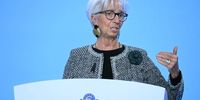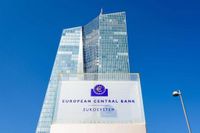The European Central Bank (ECB) announced on Thursday, April 17, 2025, another cut to its key interest rate, marking the seventh consecutive reduction since June of the previous year. This decision comes in response to worsening economic conditions in the Eurozone, exacerbated by ongoing tariff tensions and uncertainty stemming from U.S. trade policies.
According to ECB President Christine Lagarde, the risks to economic growth have intensified significantly. The ECB has lowered the deposit rate by 0.25 percentage points to 2.25 percent, a move that aims to stimulate borrowing and spending amidst a faltering economy. Additionally, the interest rate for commercial banks borrowing from the ECB has been reduced from 2.65 percent to 2.4 percent.
Lagarde emphasized during a press conference that the economic outlook for the Eurozone remains clouded by heightened trade tensions, particularly those related to tariffs introduced by former U.S. President Donald Trump. She noted, "The downside risks for growth have increased," reflecting concerns that the ongoing tariff disputes could further weaken the Eurozone's economic performance.
The ECB's action comes as inflation rates in the Eurozone have shown signs of easing, dropping to 2.2 percent in March, which is close to the ECB's medium-term target of 2.0 percent. This decline in inflation gives the ECB more leeway to implement interest rate cuts. Lagarde stated that the reduction of inflation is progressing well, which supports the decision to lower rates.
Despite the rate cuts, the ECB council remains cautious about the future. It did not provide explicit guidance on the direction of future interest rate changes, preferring to assess monetary policy on a meeting-by-meeting basis, informed by the latest economic data.
The impact of Trump's tariff policies has raised alarms among economists, with many predicting that the Eurozone economy will grow only minimally—by approximately 0.9 percent in 2025. Although Trump has temporarily suspended a flat-rate tariff of 20 percent on EU imports for 90 days, other tariffs, including a 10 percent base tariff and 25 percent tariffs on automobiles, steel, and aluminum, remain in place.
In light of these developments, concerns about the potential for a global economic downturn have grown. Clemens Fuest, president of the Ifo Institute, warned that a worldwide recession cannot be ruled out if trade tensions escalate further.
As a result of the ECB's decision, savers may face challenges. With lower interest rates on deposits, banks are likely to reduce the interest rates offered on savings accounts. Currently, the average interest rate for overnight deposits stands at just 1.4 percent, while rates for two-year fixed deposits have fallen to 2.11 percent—the lowest since late 2022.
Analysts suggest that the ECB may continue to lower the deposit rate in response to the weak economic climate and declining inflation. Lagarde has consistently warned about the risks associated with escalating trade disputes and their potential impact on global growth and prices.
In the construction sector, interest rates for loans have increased despite the ECB's rate cuts. According to Rainer Eichwede from Bausparkasse Schwäbisch Hall, the yield on ten-year government bonds rose significantly due to the announcement of a special fund, which in turn has driven up construction loan rates to over 3.5 percent. Eichwede noted that even a slight increase in the interest rate from 3 to 4 percent could result in an additional €28,000 in interest payments over ten years for a loan of €300,000.
Looking ahead, the ECB's monetary policy decisions will continue to be influenced by external factors, including geopolitical risks and the evolving economic landscape. As the situation develops, both consumers and businesses will need to remain vigilant and adaptable.
In summary, the ECB's recent interest rate cut reflects a broader strategy to bolster the Eurozone economy amid significant uncertainties. While the reduction may provide some relief to borrowers, it poses challenges for savers, highlighting the delicate balance the ECB must maintain in navigating these turbulent economic waters.








